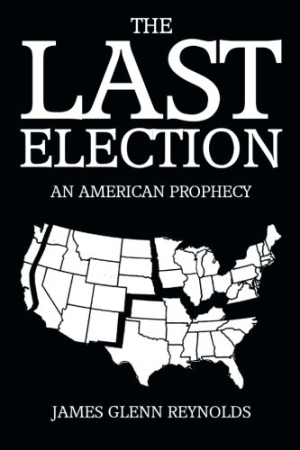The Last Election
An American Prophecy
Reynolds argues that in order to form a more perfect union, we need to abolish it.
James Glenn Reynolds thoroughly explores the political and social implications of America’s federal central authority and effectively argues for a dissolution of the United States in The Last Election: An American Prophecy.
It is unclear whether Reynolds is calling for a return to the good old days of the nineteenth century or to the good old days of the roaring, unregulated 1920s. What is clear is that Reynolds has little faith in the capacity of the American people to solve the problems confronting them today and to remain united as one country. In fact, he is looking forward to “the last election” and the dissolution of the Union.
After exhaustive analysis of the economic disaster awaiting this country, resulting from its too-large debt, Reynolds concludes:
In fact, the most peaceful pathway to human freedom and the end of destructive divisiveness on this continent would be for the United States Congress to pass a law permitting states to separate themselves from the United States by vote of their legislative bodies and for counties to be able to separate themselves from States to join other states or alliances. Doing so would create the possibility for more compatible societies. Human freedom would prevail throughout the land.
Reynolds writes well and is adept at manipulating the language in an Orwellian fashion to underscore his point. He rarely refers to the federal government in any terms other than the “Central Authority.” This Central Authority is expanding its reach and “capturing us all back into human bondage.” Reynolds does not say when exactly it was that we were last in human bondage, but he compares the political arguments over slavery just before the Civil War to the political arguments today over the Affordable Care Act, entitlement reform, abortion, and gay marriage. Reynolds does not pinpoint any specific proposal to reinstitute the practice of buying and selling human beings today; however, the author offers a contrarian view of the peculiar institution that so divided this country in the first half of the nineteenth century: “Enslavement of black Africans created a vibrant economy, placed enormous wealth in the hands of a few, put America on the global trade map, and benefited everyone.”
According to Reynolds, “the march back into human bondage” started during President Franklin Roosevelt’s first term. It was the growth of independent federal regulatory agencies and all their pages of intrusive regulations that began this long trek away from freedom and toward enslavement. The loss of essential freedom was accelerated by enactment of the Great Society programs in the late 1960s and early 1970s. Reynolds places the blame for this calamity squarely on Democrats. Even the bright star of the conservatives, Ronald Reagan, was elected by “Reagan Democrats.”
Whether liberal or conservative, readers will find The Last Election provocative and worthy of honest debate and contemplation. Reynolds is an intelligent and well-educated man, holding a law degree from the University of Chicago and having had a successful career in finance and business. In researching the book, he relies substantially on conservative historians with a flair for the contrarian point of view. Reynolds’s arguments are not new, but their presentation is fresh and stimulating.
Reviewed by
John Senger
Disclosure: This article is not an endorsement, but a review. The publisher of this book provided free copies of the book and paid a small fee to have their book reviewed by a professional reviewer. Foreword Reviews and Clarion Reviews make no guarantee that the publisher will receive a positive review. Foreword Magazine, Inc. is disclosing this in accordance with the Federal Trade Commission’s 16 CFR, Part 255.

